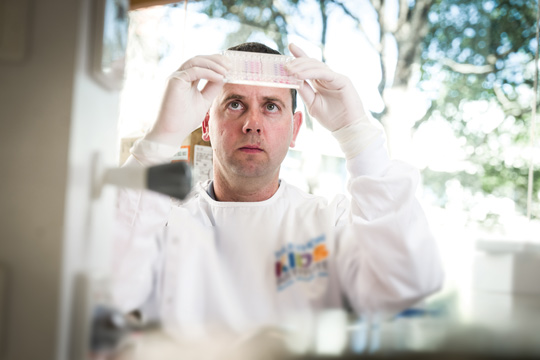In an exciting breakthrough for cancer treatment, a new weapon to enable the immune system to combat the disease may have been unlocked.
Research by the Cancer Immunology team at The Kids has revealed that some interferons – naturally occurring compounds that help coordinate the body’s defence against infection – have the capacity to make cancer go to sleep.
Dr Jason Waithman, said the more researchers could understand how the immune system works, the more they could harness it to combat complex diseases.
“Our immunology research is looking to harness the body’s natural defences to fight cancer and this is now being accepted by clinical oncologists as one of the standard pillars of treatment for people with certain cancers,” Dr Waithman said.
Getting the immune system to recognise cancer cells is key to improving and developing effective therapies.
Dr Waithman said the team’s findings would change the way people thought about interferons. Although research into these chemical messengers has been underway for more than 60 years, nobody has closely looked at the 13 alpha subtypes to see if they do different things.
“We asked a very simple question: why does the body produce so many and are some more effective than others against cancer?” he said.
The outcome was that certain interferons did stop the growth of cancer cells. They could convert an aggressive cancer such as melanoma – one of the most common cancers in Australian adolescents − into a chronic, manageable condition.

“We haven’t figured out how this is working yet,” Dr Waithman said. “That is the next phase. Once we figure out how the immune system puts the cancer to sleep, why don’t we just engineer it with this weapon? Why not use existing cellular technology that’s already clinically approved and let’s arm them up with new weapons to put the cancer to sleep?
“In my mind, this research has produced some of the most exciting results we’ve seen in the laboratory.”
Dr Waithman’s team is also working on a cancer vaccine in partnership with a biotech company, with personalised treatment tailored to an individual’s cancer.
“We now have the power to look into everyone’s cancer and identify on a personal level what sort of mutations they have in that cancer,” he said. “My job is to make a vaccine that gets the body to recognise that mutation so that your body can then hunt down the cancer and destroy it.”
He said a new cellular therapy was also coming to WA.
“It’s a living drug where you can take cells from an individual with cancer and engineer them in the lab to be able to recognise the cancer. This is mainly in leukaemia and lymphoma patients. You can basically train them up to recognise their own cancer and make a huge army and put them back in.”
What’s next?
“The next phase (with chemical messengers) is to find the human equivalents of these, as studies to date have been done in mice. We want to find the human equivalent to drive it down the clinical pathway.”
“The other thing we want to do is understand how this is occurring. Can we even bypass these compounds and figure out how the immune system can make the cancer go to sleep. When we understand how it works, can we induce it more often?”
What is immunotherapy?
Immunotherapy harnesses the body’s immune system to target and kill cancer cells. It shows immense potential to improve cancer treatment, adding another option to chemotherapy, radiotherapy and surgery.
Dr Jason Waithman's research is supported by Cancer Council WA, Perpetual Trustees, BHP, Cancer Australia & Cure Cancer Australia, Brady Cancer Support Foundation and the Department of Industry, Innovation and Science.
